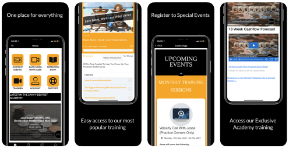Feeling fear is a natural instinct. It’s what helps keep us safe in the world. Sometimes fear can have very practical applications. For example, a fear of spiders, at its base likely stems from the fact that spiders are venomous.
While fear can help keep you safe, it can also be the thing that holds you back. While a fear of spiders might be incredibly practical living in Australia, a fear of success can be problematic for a business owner. Unpacking your fears and what drives them can be a really worthwhile endeavour that can help you to reach new heights, find greater success, and improve the profits of your business.
The Stories We Tell Ourselves Can Be Wrong
You might not realise this, but our brains are very good at making up stories about our world. Imagine that when you were growing up your biggest tormentor was a kid named Mitch. Now you might immediately distrust anyone named Mitch whether you’ve met them or not. This is a story you’ve made for yourself that alerts you to the danger of any Mitch. Of course, not every Mitch is the kid that bullied you. But we are constantly surveying our surroundings and making snap judgments based on the stories we tell ourselves. This happens all unconsciously and in a split second. We might not even be thinking, “Hey, I distrust this guy because he reminds me of the kid that bullied me,” but it’s happening in the background.
The stories we tell ourselves – just like fear – can be incredibly useful. It helps us make quick decisions about our environment to keep us safe and secure. But if the stories are wrong, they can also become harmful.
It’s important for us to take the time to unpack these stories and fears regularly so that we can tell ourselves the right stories that lead to success in both our business and personal lives.
What’s the block?
One of the best ways to begin to break down these wrong stories is to ask, “What’s the block?”
Trust is a big deal, even in the business world. I talk again and again on this blog about creating and nurturing trusting relationships with your patients. It’s also important to have trust with your teammates, vendors, and mentors.
But not everybody trusts everybody a 100%. Some people trust everyone until proven wrong. Some people believe that you need to earn their trust first. And some people never trust anyone.
If you find yourself struggling to trust an employee or a vendor, asking yourself, “What’s the block? What’s stopping you from collaborating? Is there something sabotaging you?”
You might find that the real reason why this is coming up is because of an outdated story that is no longer serving you. Once you take the time to unpack what’s happening, you can begin to fix it.
Give trust as a leader to earn trust.
Imagine this scenario: Mary and James work together. Mary doesn’t necessarily trust James. James picks up on her non-verbal communication without her saying a word. He knows that Mary doesn’t trust him so how is he going to respond?
He likely won’t take what she’s saying at face value. He might think there’s an agenda. He might not follow through on every aspect of his role that he needs to be successful. He might not communicate effectively with her.
Once you’ve done the work to unravel the wrong story you’ve been telling yourself, you can begin to offer trust to your team members and patients. This comes back to body language.
You might be surprised by 55% of communication is through body language. This means that before we even utter a word, everyone is already reading the room and making judgments about the situation based on their own stories of the world.
When you can take a moment to take a step back and think about the story you’re telling yourself, you will also change your body language. If you are feeling a resistance to a person or idea, try leaning into it. Why are you feeling this? What’s happening right now? What’s the deeper truth?
When we can make these small changes, we can become better leaders with teams that are more committed to us and to the success of our businesses.
Biases at play in the workplace.
The stories we tell ourselves can also show themselves in the form of biases. Biases stem from our past experiences, our cultures, our values, and our beliefs.
A lot of research has shown, for example, that we have unconscious biases toward people that remind us of ourselves. This plays out frequently in interview scenarios. If you’ve ever met someone and immediately liked them right off the bat, it is likely because they remind you of yourself. Maybe it’s that they went to your school or college, they have the same culture, the same interest, or maybe even the same name.
This also plays out on the flipside as well. Just like in the above example, if you have an interview with a Mitch, you might find you have a natural resistance toward him. Your natural bias is trying to keep you safe. It’s saying, “Remember what happened to you the last time you befriended a Mitch.”
Of course, everyone has biases. It’s not something we can eliminate altogether, but it is something that we can try to bring to a more conscious level. When you are making decisions, try to unpack the reasons behind your ‘gut instinct’. Is there is a reason you’re reacting the way you are?
Final Words…
Fear is an everyday emotion. It can be incredibly healthy and helpful when it’s targeted toward situations that might harm us. But as humans, our level of risk on a day to day basis is much lower than its ever been. If you find yourself meeting resistance toward new situations or new people, try unpacking the unconscious stories your brain is telling you to keep you safe. Is this a helpful story?
If it’s not, it’s fine to throw it out and replace it with something that will help you succeed.
P.S. Whenever you’re ready …. here are 4 ways I can help you grow your dental practice:
1. Grab a free chapter from my book “Retention – How to Plug the #1 Profit Leak in Your Dental Practice” The book is the definitive guide to patient retention and how to use internal marketing to grow your practice – Click Here
2. Join the Savvy Dentist community and connect with dentists who are scaling their practice too
It’s our Facebook group where clever dentists learn to become commercially smart so that they have more patients, more profit and less stress. – Click Here
3. Download The Savvy Dentist App
The Savvy Dentist iPhone and Android App is a great way to keep up to date with the latest Savvy Dentist Podcasts, Blogs, Events and so much more. – Download Now
4. Work with me and my team privately
If you’d like to work directly with me and my team to take your profit from 6 figures to 7 figures …. just send me a message with the word “Private”… tell me a little about your practice and what you would like to work on together, and I’ll get you all the details! – Click here






